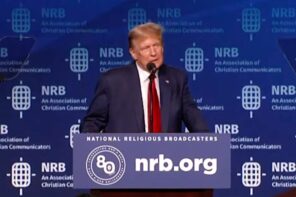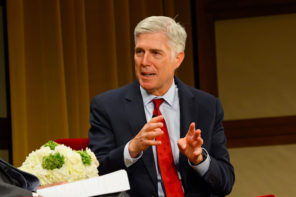I don’t pay nearly as much attention as I should to the views on religion espoused by our Supreme Court justices. I learned that lesson shockingly today when I stumbled across (ah, the joys of Web-surfing) a speech given by Associate Justice Antonin Scalia four years ago at a conference on the death penalty. Scalia said he was neutral on the subject, but the whole speech was a justification of the death penalty based on the premise that the state must do the will, not of the people, but of God.
Scalia notes (correctly, I think) that for most of Western history people assumed that the state derived its authority from God. But then he argues, quoting St. Paul (Romans 11) at length, that a believing Christian must hold the same political theory today: Authority comes from God. So when a state puts a person to death, it is merely a servant doing the will of God.
Scalia laments that democracy, with its new theory of political power vested in the people, has undermined this traditional view of divine legitimation. Then he continues:
The reaction of people of faith to this tendency of democracy to obscure the divine authority behind government should not be resignation to it, but the resolution to combat it as effectively as possible. We have done that in this country (and continental Europe has not) by preserving in our public life many visible reminders that, in the words of a Supreme Court opinion from the 1940s: “We are a religious people, whose institutions presuppose a Supreme Being.”
These reminders include: “In God We Trust” on our coins; “One Nation, Under God” in our Pledge of Allegiance; the opening of sessions of our legislatures with a prayer; the opening of sessions of my Court with “God save the United States and this Honorable Court”; annual Thanksgiving proclamations issued by our president at the direction of Congress; and constant invocations of divine support in the speeches of our political leaders, which often conclude, “God Bless America.” All this, as I say, is most un-European, and helps explain why our [American] people are more inclined to understand, as St. Paul did, that government carries the sword as “The minister of God” to “execute wrath” upon the evildoer.
If governments can kill to execute God’s wrath on evildoers, no doubt they can torture too. And of course each government gets to decide for itself what God wants and who is an evildoer. Yet we must combat the tendency of democracy to obscure the divine authority behind government. Can Scalia truly understand the implications of his theory, when it is projected on a global scale?
But there’s really no great cause for worry, Scalia adds, because “for the believing Christian, death is no big deal,” especially when someone is dying as justified punishment for their having taken the life of an innocent (which is a big deal for Christians, Scalia says).
This is all breathtakingly shocking. What’s more shocking to me is that, though I knew Scalia was conservative and Catholic, I had no idea he publicly justifies his conservative views by blasting a hole in the wall of separation between church and state big enough to drive a Popemobile through.
I do know enough to know that there’s a huge debate among legal experts about how to apply Justice Douglas’ words, “We are a religious people, whose institutions presuppose a Supreme Being.” Scalia’s view is on one extreme. Do the other three avowed conservatives on the Court share his view? If I want to be an informed citizen, I ought to find out.
I did quickly find an answer to an easier question: How old is the oldest member of the Court, Justice Stevens? He’ll be 88 in April. If this relatively liberal justice is still sitting on next Inauguration Day, he’ll surely be replaced by the next president. Yet another reason to take both the views of Supreme Court justices and the upcoming presidential election immensely seriously.




